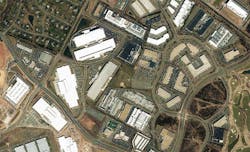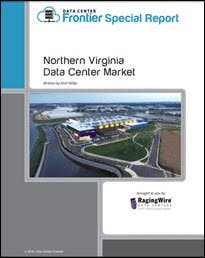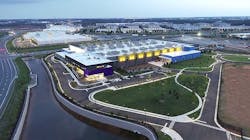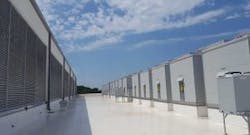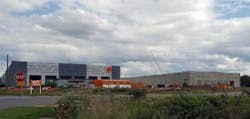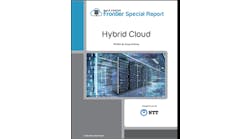Northern Virginia Data Center Market: The Focal Point for Cloud Growth
The Northern Virginia Data Center Market is currently experiencing a data center building boom unlike any the industry has ever seen. As data center REITs and colocation providers compete to provide capacity for cloud services providers with big needs, the region is seeing an unprecedented surge in development and demand.
Download the new Special Report covering the Northern Virginia Data Center Market.
Northern Virginia is home to more than 150 data centers and tends of millions of square feet of data center space. As the cloud grows, having servers in the region has become the table stakes for companies with ambitions in cloud computing. The area is unique in its connectivity.
The region traces its connectivity roots back to to the U.S. Government’s early development of wide-area fiber optic networking in the late 1960s, and includes a variety of towns in Loudoun, Prince William and Fairfax counties. Much of the activity focuses on a fiber-rich area in Ashburn known as “Data Center Alley.”
Development in Northern Virginia is driven by the extraordinary growth of cloud computing, and especially Amazon Web Services, which has invested $35 billion in data centers in the region, along with multi-billion dollar investments by Facebook, Microsoft and Google, which all operate large campuses.
Estimates of the data center capacity in Northern Virginia vary. As of mid-2021, industry research firm datacenterHawk finds 3,428 MWs of capacity in Northern Virginia, including 1,737 MWs of hyperscale development and 1,691 MWs of multi-tenant capacity. Real estate firm JLL estimates the market at 2,801 megawatts (MWs) and 31.1 million square feet of inventory, while CBRE assesses it at 1,503 MWs.
What’s clear is that by any measure, Northern Virginia is the world’s largest market for data centers and cloud computing, and is significantly larger than all other markets. These numbers reflect the steady stream of new players entering the markets – such as Yondr, TA Realty, Landmark Dividend and Cologix – as well as major expansions by experienced players like Digital Realty, Equinix, AWS, Vantage Data Centers, Aligned, CloudHQ and many others.
2018: A Big Year for the Northern Virginia Data Center Market
Data center operators in Northern Virginia leased as much as 500 megawatts of capacity in 2020, according to North American Data Centers, nearly doubling the previous record for annual absorption. Some other estimates place the number closer to 300 MWs, but either number far exceeds all other markets and reinforces the centrality of Northern Virginia in the industry.
That leasing activity is accompanied by record valuations for land in Data Center Alley, as the region experiences a surge in “land banking,” as developers buy up property to secure space for future campuses. Sites have sold for more than $2 million ana cre in Ashburn, and are now topping $1 million an acre in Prince William County.
The region’s colocation and wholesale data center providers don’t expect demand to slow anytime soon.
The Northern Virginia data center market is spread across a number of towns in Loudoun, Prince William and Fairfax counties, and shows signs of expanding into adjacent counties. (Photo: RagingWire Data Centers)
Why Northern Virginia?
Ashburn is the Internet’s boom town. It sits atop the world’s densest intersection of fiber networks, making it an ideal location to store and distribute data. It is unique in its connectivity, and its data centers are laying the physical foundation of the digital economy.
Why is Ashburn, which lies about 30 miles west of Washington in Loudoun County, such an important site? It was home to MAE-East, the Internet’s first major interconnection point. A startup called Equinix built its first data center in Ashburn in 1998, providing a “carrier-neutral” facility where companies’ networks could tap into Internet backbones. The Equinix campus quickly become the Web’s busiest meeting place, creating a powerful network effect in which each new connection adds to the value of its digital ecosystem.
Location is key for data center providers, and Northern Virginia offers a strategic, cost-effective market for companies needing their data center in the northeastern United States. There is also a relatively low threat for natural disaster, as other than occasional high winds and rain from hurricane remnants, the Northern Virginia market is typically very safe. Another key aspect drawing more and more data center providers to the region is affordable and reliable power costs, which are competitive among major colocation markets and reasonable considering the total cost of occupancy for long-term requirements. The primary power utility, Dominion Virginia Power, has a track record of reliable delivery for data centers.
A view of the roof of the new CloudHQ data center in Manassas, Virginia shows some of the 152 Kyoto Cooling units supporting the facility. (Photo: Rich Miller)
And the region is simply ripe for business. Loudon County is the number one county in America for personal income, with an average household income reaching beyond six figures to $125,900, according to Census Bureau information. With an unemployment rate of 3.3 percent, and a sales tax exemption for data center customers that goes through 2035, it’s easy to see why the area is attracting the bigwigs of colocation.
Regional Data Center Trends to Watch
Beyond regional trends in supply and demand, there are two specific trends surfacing in Ashburn, specifically. First, developers are building taller data centers to maximize the sellable space on each acre of land, and they are also buying offices or industrial properties and then demolishing existing structures to make way for data centers. These trends will work to influence the development and evolution of Data Center Alley in coming years. Those watching growth in the region will also have noticed developers are looking beyond Ashburn to Loudoun and Prince William counties.
As the largest data center market in the country, many of the trends that have gone on to shape the entire business originally stemmed from Northern Virginia. One emerging trend to watch is the widening gap between hyperscale and enterprise requirements, and whether this market segmentation prompts providers to focus on one of these niches or compete across all sectors.
As for trends in demand, Northern Virginia continues to be the “Home of the Hyperscalers”, touting the world’s largest concentration of cloud computing infrastructure. As cloud providers compete for clients and capacity, data centers will be the front line. As a result, the leading cloud computing players are working to amass capacity for the clouds of the future, which is ramping up demand in Northern Virginia and resulting in giant deals for data center space under development. Amazon Web Services, Facebook and Microsoft have always been focused on the region, but it is now also becoming a goal for expansion for companies like Google, Oracle, Salesforce and Chinese cloud providers, as well as data-driven companies like Uber, LinkedIn, Box and Dropbox.
This strong demand has largely redefined the scale of data center leasing, which is surging past previous records. Prior to 2016, it was unusual to see a wholesale data center lease exceeding 10MW of capacity. In 2018, the reported 72MW deal by CloudHQ made the new high in the market. That’s why developers are rushing to keep up with strong demand. Data center growth at Amazon Web Services, as reflected in these facilities under construction in Virginia, continues to make headlines.
What’s driving this growth? According to Data Center Frontier’s latest report on Northern Virginia, insatiable demand real-time news, sports, music and video—an ocean of data that will soon extend to virtual reality, self-driving cars and the Internet of Things (IoT). It will certainly be interesting to see this demand/supply balance play out as the major players in Northern Virginia seek room for expansion, while new players buy land to join the action in Ashburn.
The growth of the data center sector has been good for the region.
“This year in Loudoun County we will have a quarter billion dollars of tax revenue from data centers,” said Buddy Rizer, Executive Director of Economic Development. “Data centers are the engine of innovation. They enable a lot of other businesses.”
Biggest Colo Players in Northern Virginia
As for the biggest players in the Northern Virginia Data Center Market, it reads like a who’s who of cloud providers, data center leaders and colocation giants.
Below is an overview of major data center and colocation providers in the Northern Virginia data center market:
- Aligned
- Amazon Web Services
- American Real Estate Partners
- AT&T
- Chirisa Tech Centers
- CloudHQ
- Cologix
- Compass Datacenters
- CoreSite
- Corporate Office Properties Trust
- CyrusOne
- Cyxtera
- Digital Realty
- Element Critical
- Equinix
- Evoque Data Center Solutions
- Iron Mountain Data Centers
- Landmark Dividend
- Lincoln Rackhouse
- NTT Global Data Centers Americas
- QTS Realty Trust
- Sabey Data Centers
- Sentinel Data Centers
- STACK Infrastructure
- Vantage Data Centers
Explore the Northern Virginia colocation market further through Data Center Frontier’s special report series and ongoing coverage of the growing colocation industry in the top data center market in the country, which can be found below.

